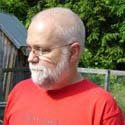[22] "Of course we have the right to use an assertion sign in contrast with a question-mark, for example, or if we want to distinguish an assertion from a fiction or a supposition. It is only a mistake if one thinks that the assertion consists of two actions, entertaining and asserting (assigning the truth-value, or something of the kind), and that in performing these actions we follow the prepositional sign roughly as we sing from the musical score." 22 seems clear enough in its main emphasis, that the punctuation is a transcription of an already existent meaning, not a determinent of the meaning. But I also get the sense from this remark that Wittgenstein is working against the language-as-transcription-of-thought cognitive model. That is, we do not transcribe thought into language so much as make thought (meaning) through the use of language. This is a relatively uncontroversial notion for a poet, but I suspect it raises the hackles of certain scientists & analytical philosophers.
Philosophical Investigations
Christopher Robinson & Joseph Duemer read Wittgenstein's Philosophical Investigations


0 Comments:
Post a Comment
<< Home